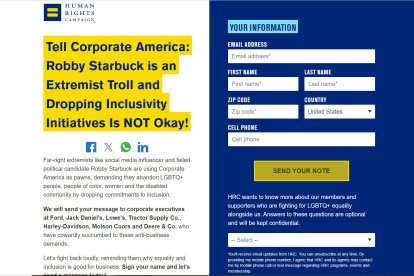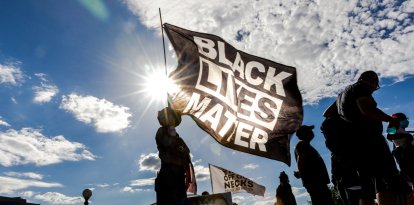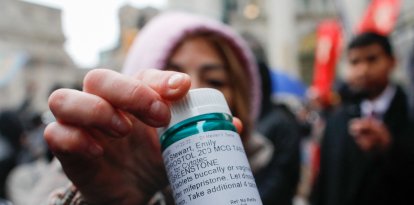Ford, Harley-Davidson, John Deere... big companies are abandoning Diversity, Equity and Inclusion
More and more executives at some of the nation's largest companies are dismissing DEI programs, citing legal and financial fears.

Ford factory in Dearborn, Michigan
Diversity, Equity and Inclusion (DEI) policies are on their way out. The acronym, an umbrella term for progressive measures, became all the rage in the corporate world after the BLM protests in 2020. Four years later, they are disappearing from the agendas of iconic U.S. companies such as Ford, John Deere, Harley-Davidson, Polaris, Indian Motorcycle, Lowe's... And, as of Friday, Caterpillar.
"The landscape of corporate America is quickly shifting to sanity and neutrality," said activist Robby Starbuck when the machinery manufacturer informed him of a series of changes: “No more woke trainings," Starbuck enumerated, "no donations to divisive events." "all sponsorships, speakers, donations and events must be approved at the executive level to ensure that nothing is divisive or politically charged.”
The Cuban American activist claims that Caterpillar executives decided to change their policies after he told them "that I was planning to expose their woke policies.”
He also celebrated the fact that it is the "biggest" company which he has managed to impact with his public anti-DEI lobbying campaign, in a list that, he says, includes Tractor Supply, John Deere, Harley Davidson, Polaris, Indian Motorcycle, Lowe's, Ford, Molson Coors, Stanley and Black & Decker.
One of the key steps taken by Caterpillar, considered glaring evidence of the backlash against the DEI, is that it will no longer participate in a Human Rights Watch (HRW) ranking that evaluated "policies, practices and benefits pertinent to lesbian, gay, bisexual, transgender and queer (LGBTQ+) employees," known as the Corporate Equality Index.
From pride to silent removal
Having a 100 on the CEI was, until recently, a source of pride for many companies. The ranking is a total of numerical evaluations on criteria such as "transgender-inclusive benefits" and "outreach and engagement to the LGBTQ+ community."
The criteria evaluated include everything from suppliers of choice to philanthropy, where points are earned for donating money to LGBT organizations, to staff selection and advertising and marketing.
These companies like Harley-Davidson and Jack Daniel's, which were once proud of these policies, have stopped endorsing the HRW report card. In 2018, for example, Ford celebrated being "the first automaker to earn a perfect score on the Corporate Equality Index and it has continued to earn 100 percent in every report since 2004." Six years later, CEO Jim Farley wrote that the company had decided "to stop participating in external cultural surveys such as the Human Rights Campaign's Corporate Equity Index and 'best places to work list.’”
The blow has not gone down well with HR, which launched a campaign to collect signatures against seven companies "who have cowardly succumbed to these anti-business demands" and accused "far-right extremists," specifically Starbucks, of using corporations as "pawns."

Human Rights Watch campaign against companies that dropped out of the Corporate Equality Index.
What led to this change?
Goldman Sachs allowed white students to attend its "Possibilities Summit," previously for Blacks only. Zoom fired its DEI team. Google and Meta withdrew funding from their DEI programs.
The string of changes is multi-causal. Some analyses point to the fact that, although the anti-DEI movement had begun long ago, the Supreme Court's race-based admissions were illegal helped catalyze the abandonment. According to a report from law firm Littler, 40% of executives agreed with this view.
However, the criticism goes back. A study from 2013 by the University of Washington claimed m that diversity programs "give illusion of corporate fairness." "Our findings suggest that diversity programs can be window dressing - even those that do very little to increase diversity may still be perceived as effective," argued Cheryl Kaiser, a psychology professor.
A decade later, Sherry Sylvester from the Texas Public Policy Foundation argues, like Kaiser and her colleagues, that there is no evidence of benefit from DEI policies:
"I have frequently noted that I have yet to hear a DEI advocate provide examples proving that DEI has been effective in increasing minority recruitment, either in business or in academic institutions, or improving student performance or outcomes on college campuses. No one is providing evidence of success (and tons of evidence is showing it is harmful), but the pro-DEI crowd ignores that question too."
Another frequent criticism of DEI initiatives is that they overshadow, even undermine, the profit motive. In addition to fights within the corporate leadership, this has resulted in lawsuits. In August last year, for example, a Target shareholder sued the company for "causing Target shareholders to lose billions of dollars," preferring "to virtue signal to leftist extremists."
Analysts also point out the companies wanting to broaden their audience. Tractor Supply and Harley-Davidson acknowledged that they want to attract more conservative customers. The catchphrase "Go Woke, Go Broke" became popular as an anti-DEI rally cry after Bud Light launched a campaign with the transgender influencer Dylan Mulvaney. A boycott campaign, called by consumers themselves, resulted in a drop in sales which other companies took as a warning, including Target.
The pressure is also judicial. American First Legal is among the firms that have sued several companies such as Walt Disney Corporation and its subsidiaries in February for intentionally failing to hire men, Jews and Christians. Meta, Pfizer, CBS, Wells Fargo, are other companies that have been taken to court.
A new era
Executives are increasingly avoiding using the term DEI in public. Johnny Taylor, president of the human resources association Society for Human Resource Management, told Axios behind closed doors, that he and others are fed up.
Another widespread sentiment among top management and boards of directors is that while the three words were appealing when they seemed to be supported by the majority of society, the backlash has since put the business at risk. And if they no longer serve the business, it's time to scrap them.
"Americans oppose DEI because it promulgates a race-based ideology that pits students - and all Americans - against each other based on their ancestry," argues Sylvester from the Texas Public Policy Foundation. "It creates guilt in those who have done no wrong and exonerates others from responsibility for their lives."
One poll conducted by The Daily Wire shows 66% of adults oppose hiring based on race and gender. Another one from The Washington Post and Ipsos found that 61% of Americans think they are "a good thing" (though they admit there is a clear differences based on political party preference). Increasingly, however, the question seems to be not where the majority stands, but why does the minority oppose it (according to those two polls, about 30% of adults - and especially if they are considered to be from the Go Woke, Go Broke group).
But the evidence of discontent continues to pile up, between boycotts, lawsuits, state laws against DEI policies, in areas beyond business.

Society
Air Force documents reveal its DEI 'goal': Reducing the 'white male population' among officers
Verónica Silveri Pazos




























